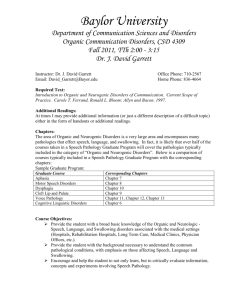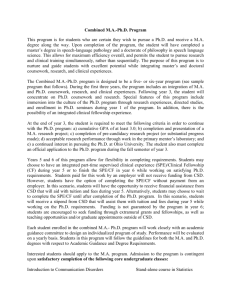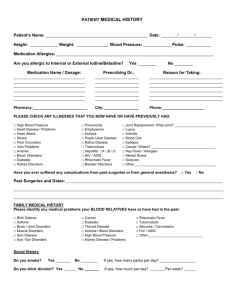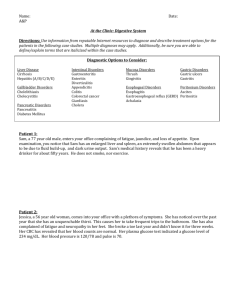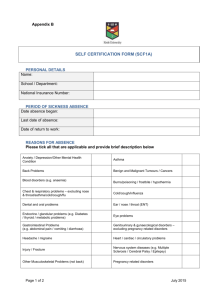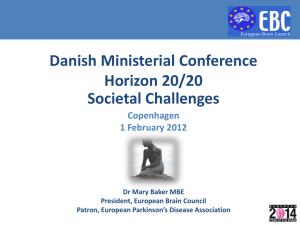CSD 2013-14 - College of Health Sciences
advertisement
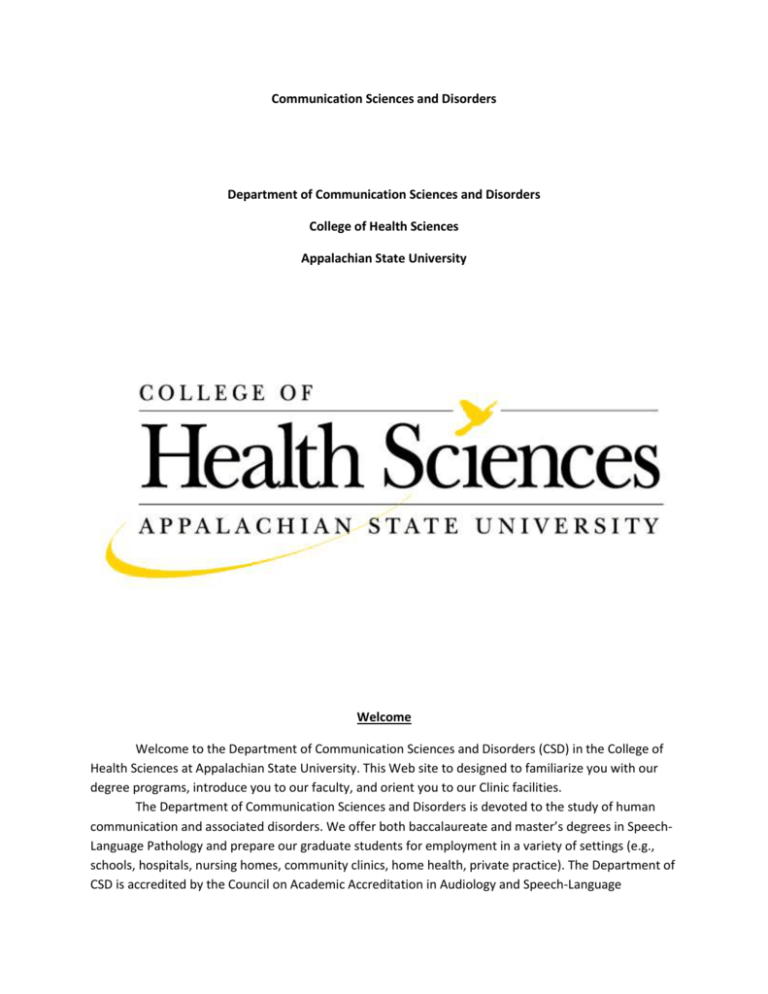
Communication Sciences and Disorders Department of Communication Sciences and Disorders College of Health Sciences Appalachian State University Welcome Welcome to the Department of Communication Sciences and Disorders (CSD) in the College of Health Sciences at Appalachian State University. This Web site to designed to familiarize you with our degree programs, introduce you to our faculty, and orient you to our Clinic facilities. The Department of Communication Sciences and Disorders is devoted to the study of human communication and associated disorders. We offer both baccalaureate and master’s degrees in SpeechLanguage Pathology and prepare our graduate students for employment in a variety of settings (e.g., schools, hospitals, nursing homes, community clinics, home health, private practice). The Department of CSD is accredited by the Council on Academic Accreditation in Audiology and Speech-Language Pathology (CAA), an entity within American Speech-Language-Hearing Association (ASHA). The CAA is authorized to accredit graduate education programs for the professions of audiology and speechlanguage pathology. Our undergraduate degree is the Bachelor of Science Degree (B.S.) in Communication Sciences and Disorders. Students who complete the undergraduate program receive the academic and clinical preparation necessary for graduate study. This program is preprofessional in nature. Our graduate degree is the Master of Science Degree (M.S.) in Speech-Language Pathology. Students who complete the graduate program gain the necessary academic and clinical practicum experiences for certification by ASHA, licensure by the North Carolina Board of Examiners in Speech-Language Pathology and Audiology, and advanced licensure by the North Carolina State Department of Public Instruction. Both our undergraduate and graduate programs support the department’s mission to prepare students for careers in speech-language pathology. The Department’s greatest assets are the skills and expertise of our faculty and the strong clinical focus of our program. Our program offers students the opportunity for study with faculty who are nationally recognized in their areas of expertise. We are proud of the quality of instruction that our students receive in the classroom as well as the opportunities we provide for them to work alongside faculty in a variety of clinical settings. All faculty hold a Certificate of Clinical Competence and are actively involved in creative scholarly endeavors, clinical services, and/or research projects. Our on-site clinical facility, the Charles E. and Geneva S. Scott Scottish Rite Communication Disorders Clinic, is one of the largest university-based clinics within the state. It is well established in reputation and is recognized for the outstanding clinical services provided to individuals of all ages from the Boone and Western North Carolina regions. If you would like to learn more about the Department of Communication Sciences and Disorders in the College of Health Sciences at Appalachian State University, located in the beautiful Blue Ridge Mountains of northwestern North Carolina, please explore our Web site. To obtain further information or to arrange a visit and tour of our Clinic facilities, please contact Ms. Eveline Watts at 828-262-7182 or email her at: wattsem@appstate.edu to arrange a visit. Angela Losardo Chair, Department of Communication Sciences and Disorders Introduction to Our Department The Department of Communication Sciences and Disorders in the College of Health Sciences at Appalachian State University is devoted to the study of human communication and associated disorders. The Department offers the Bachelor of Science Degree (B.S.) in Communication Disorders and the Master of Science Degree (M.S.) in Speech-Language Pathology. The Master of Science (M.S.) degree in Speech-Language Pathology is accredited by the Council on Academic Accreditation in Audiology and Speech-Language Pathology (CAA), an entity within the American Speech-Language-Hearing Association. The CAA is authorized to accredit graduate education programs in both audiology and speech-language pathology. The undergraduate and graduate programs support the Department’s mission to prepare students for careers in speech-language pathology. The Department is home to the Charles E. and Geneva S. Scott Scottish Rite Communication Disorders Clinic which serves as a community-based training facility for graduate students pursuing their Master’s degree in Speech-Language Pathology. The Clinic has provided quality services to children, adolescents and adults with communication disorders since 1968. Accreditations Undergraduate Degree Program The Bachelor of Science (B.S.) degree is accredited by the Southern Association of Colleges and Schools (SACS). The Southern Association of Colleges and Schools (SACS) is a regional educational accreditation agency for public and private educational institutions in the southern United States. Graduate Degree Program The Master of Science (M.S.) degree in Speech-Language Pathology at Appalachian State University is accredited by the Council on Academic Accreditation in Audiology and Speech-Language Pathology of the American Speech-Language-Hearing Association, 2200 Research Boulevard #310, Rockville, Maryland 20850, 800-498-2071 or 301-296-5700. The Master of Science (M.S.) degree in Speech-Language Pathology at Appalachian State University is accredited by the National Council for Accreditation of Teacher Education. Vision Statement The Department of Communication Sciences and Disorders is a community of scholars and practitioners educating students in models of best practice through the integration of instruction, research, and regional service. Mission Statement The mission of the Department of Communication Sciences and Disorders is to prepare students for careers in speech-language pathology. Students attain knowledge and skills in basic human communication processes, and in the prevention, assessment, and treatment of communication disorders through outcome-based educational practices. Students master established knowledge and skill outcomes in the classroom as well as in the Department’s Communication Disorders Clinic. The primary purpose of the Charles E. and Geneva S. Scott Scottish Rite Communication Disorders Clinic is the provision of clinical learning experiences for students in the Department of Communication Sciences and Disorders. The Clinic is a non-discriminatory provider of quality comprehensive speech-language pathology and audiology services (See the ASHA Scope of Practice) to individuals of all ages in the Boone and Western North Carolina regions. Strategic Plan The mission of the Department of Communication Sciences and Disorders will be achieved by maintaining a student-centered learning environment; integrating the scientific and service aspects of the profession by promoting co-inquiry among faculty and students; providing an outcome-based clinical education; offering comprehensive services to the region and honoring human diversity. Specifically the following action plans will be implemented: A. To have a student-centered, outcome-based learning environment, the program will: 1. Use research and evidence-based practice to guide and evaluate all clinical and academic programs. 2. Engage students in the professional community by: a. Encouraging student representatives on committees to attend all scheduled meetings, and to inform their constituents (undergraduate and graduate students) of the results of these meetings. b. Establishing a process for faculty and students to discuss selected topics of interest. c. Encouraging participation in professional organizations and activities. 3. Support students in their development of professional interpersonal and communication skills by: a. Identifying a person on the faculty, usually the academic advisor, who will guide and support each student in conflict resolution. b. Developing a process for obtaining accurate and honest formative assessment from students regarding the program. 4. Monitor student achievement of knowledge and skills outcomes across time. 5. Encourage community development by: a. Holding social events for faculty and students. b. Sponsoring a commencement reception. 6. Maintain syllabi illustrating how the outcomes will be demonstrated through course work and clinical experiences. 7. Conduct ongoing evaluation of outcome-based education, modify policy as indicated, and disseminate findings professionally. 8. Provide opportunities for students to develop and test hypotheses. B. To integrate the scientific and service aspects of the profession by promoting co-inquiry among the faculty and students, the program will: 1. Design and conduct research projects in the field of Communication Sciences and Disorders including clinical efficacy, education, outcome research, and program evaluation. 2. Assess typical and atypical development through the design, selection and use of appropriate formal and informal assessment procedures and tools. 3. Analyze psychometric properties of assessment tools. 4. Critique and analyze clinical/curriculum activities and programs. 5. Encourage student involvement in classroom-based projects that culminate in professional presentations and data-based publications. C. To enhance the acquisition and integration of knowledge and skills crucial for professional development, the program will: 1. Identify faculty interested in collaborative teaching and/or research. 2. Secure administrative support for collaborative teaching and/or research. 3. Conduct relevant curricular assessment. D. To offer comprehensive services to the region, the program will embark upon the following actions: 1. Achieve excellence in clinical management by: a. Maintaining HIPAA compliance. b. Using databases for monthly billing, quality improvement, and research. c. Pursuing marketing strategies and increasing visibility. d. Maintaining lines of communication between the Clinic Director and off-campus supervisors, including an annual in-service related to supervision. e. Utilizing electronic communication for students and supervisors in on-campus and off-campus practicum sites. 2. Continue to enhance the quality of existing clinical programs as well as to develop new programs through established program policies and procedures by: a. Developing and maintaining a sensitive and responsive quality improvement program, including program evaluation of all clinical services. b. Providing continuing education opportunities for clinical educators in the area of clinical teaching and supervision. c. Exploring opportunities for co-teaching/supervision among clinical educators. d. Establishing a process for evaluating the effectiveness of selected off-campus practicum sites. e. Continuing to explore partnerships for service delivery with hospitals, nursing care centers, schools, and other human service agencies in the region. f. Continuing to explore the provision of aural rehabilitation services. g. Continuing services for individuals with severe language-based reading disabilities. h. Exploring ways to provide experiences with individuals who have voice and fluency disorders. i. Continuing to develop the Clinic's role in prevention, wellness, and community education activities. 3. Participate in collaboration among clinical programs at Appalachian State University and regional service agencies for the provision of health and human services to individuals and families in Northwestern North Carolina by: a. Continuing participation on the task force to explore the collaborative potential of health and human service programs in the University and community. b. Explore opportunities for collaborative assessment and intervention services. 4. Develop a research focus on clinical education and clinical efficacy. E. To honor human diversity the program will promote: 1. Scholarly study in the areas of normal communication, linguistic variation, and disorders in culturally and linguistically diverse (CLD) populations. 2. Development and application of best clinical practices for speech-language pathologists who aspire to serve CLD populations. 3. Advocacy for CLD populations regarding prevention, identification, and treatment in the discipline of Communication Sciences and Disorders. 4. Career participation of professionals representative of and those dedicated to CLD populations. 5. Support, networking, and mentoring opportunities in scientific and clinical endeavors relating to CLD populations. 6. Continuing education programs related to communicative disorders and CLD populations. 7. Recognition of the University's policy on diversity. Facilities Department of Communication Sciences and Disorders College of Health Sciences Appalachian State University The Department of Communication Sciences and Disorders (CSD) is located in Edwin Duncan Hall at Appalachian State University. The Department is devoted to the study of human communication and associated disorders. We offer both baccalaureate and master’s degrees in Speech-Language Pathology and prepare speech-language pathologists for employment in a variety of settings (e.g., schools, hospitals, nursing homes, community clinics, home health, and private practice). The Department of CSD is accredited by the Council on Academic Accreditation in Audiology and SpeechLanguage Pathology (CAA). CAA, an entity within ASHA, is authorized to accredit graduate education programs for the professions of audiology and speech-language pathology. Charles E. and Geneva S. Scott Scottish Rite Communication Disorders Clinic College of Health Sciences Appalachian State University The Department is home to the Charles E. and Geneva S. Scott Scottish Rite Communication Disorders Clinic which serves as a community-based training facility for graduate students pursuing their Master’s degree in Speech-Language Pathology. The Clinic, a non-profit organization, is located in University Hall at Appalachian State University. Established in September of 1968, the primary mission of the Clinic is to provide clinical learning experiences for students majoring in speech-language pathology. The Clinic is recognized for the outstanding clinical services provided to individuals of all ages from the Boone and Western North Carolina regions. Undergraduate Program Bachelor of Science Degree (B.S.) in Communications Sciences and Disorders The undergraduate Bachelor of Science Degree program in Communication Sciences and Disorders at Appalachian State University is located in the Department of Communication Sciences and Disorders in the College of Health Sciences. Because licensure and certification as a speech- language pathologist or audiologist by the State of North Carolina and the American Speech-Language-Hearing Association require successful completion of an appropriate graduate degree, this program is preprofessional in nature. It is devoted to the study of human communication and associated disorders. Students are provided with the academic preparation and clinical exposure necessary for graduate study. The Communication Sciences and Disorders Program is a limited enrollment program that requires applicants to meet a specific core of admission requirements. At Appalachian State University undergraduate students pursue a 49 hour major that focuses on normal development of speech, language, and hearing processes as well as on associated disorder areas. In the last year of the program, students fulfill the role of participant-observer as they complete 25 observation hours in the ASU Communication Disorders Clinic. This experience is designed to give undergraduate students exposure to individuals with communication disorders. In addition to the observation experience, students spend an average of two hours per week as a co-clinician with a graduate student, providing therapy for individuals with communication disorders. On this Web site, you will find a listing of the requirements for admission to the program and a typical sequence of study for an undergraduate in Communication Disorders. Areas of academic interest are similar to minor areas of study and allow a student to pursue in-depth study in areas related to communication disorders. Popular areas of academic interest include: professional education related to public school employment; childhood education, special education, and reading and language arts. With the guidance of an academic advisor, students may elect to pursue these academic interest areas or may choose from a variety of other areas. Sample listings of academic interest areas are available on this Web site. If there are additional questions that you may have about Appalachian State University’s undergraduate Bachelor of Science Degree program in Communication Disorders, please write or call. In addition to discussing the program with you, we would be happy to arrange a visit to campus so that you may meet with individual faculty and students. We conduct these tours and meetings one Friday a month. If you are interested in a quality program that offers you the opportunity to work with an exceptional faculty and outstanding students from all regions of the United States, please consider submitting an application. Program of Study for Bachelor of Science Degree (B.S.) in Communication Sciences and Disorders The Department of Communication Sciences and Disorders offers a pre-professional undergraduate degree in the study of human communication and associated disorders. An appropriate graduate degree is required for licensure by the State of North Carolina and Certification by the American SpeechLanguage-Hearing Association. Bachelor of Science in Communication Sciences and Disorders (BS) 2013-2014 College of Health Sciences (CHS) Department of Communication Sciences and Disorders Major Code 820A CIP Code 51.0201 Non-Teaching Interim Department Chair: Dr. Dawn Botts 828-262-7182 bottsdc@appstate.edu www.comdis.appstate.edu General Education ................................................................................................................44 Major Requirements… .................................................................................................... 52-53 GPA Requirements: A minimum grade of 2.0 is required for each course in the major. STT 1810 _ (3) (pre-req MAT 1010) STT 2810 (3) (pre-req MAT 1010) or STT 2820 (4) STT 2820 may satisfy General Education Quantitative Literacy PSY 2210 (3) Psychology of Human Growth and Development CSD 2259 (3) Communication Disorders CSD 2260 (3) Anatomy and Physiology of the Speech and Hearing Mechanism *CSD 2361 (3) Phonetics *CSD 2464 (3) Basic Speech and Hearing Science *CSD 2465 (1) Basic Speech and Hearing Science Laboratory CSD 3201 (3) Language Disorders Across the Lifespan CSD 3202 (3) Speech Disorders Across the Lifespan CSD 3320 (3) Cultural Diversity and Communication Disorders CSD 3340 (3) Syndromes and Conditions with Associated Communication Disorders *CSD 3350 (3) Evaluating Research in Communication Sciences and Disorders (Writing in the Discipline) CSD 3366 (3) Communication Development *CSD 4162 (3) Structural Analysis of Language *CSD 4364 (3) Audiology *CSD 4662 (3) Management of Hearing Disorders *CSD 4766 (3) Neuroanatomy and Physiology CSD 4850 (3) Adult Language Disorders (Senior Capstone) * Must be admitted to the CSD Undergraduate Degree Program to enroll in these courses. Academic Interest Area…………………………………………………………………………… 15 (Selected with approval of advisor, minimum grade of 2.0 required for each course) Electives……..…………………………………………………………………………………..up to 11 General Education Courses Taken for the Major…- 4 if STT 2820 used for Quant Literacy TOTAL……………………………………………………………………………………....……….. 122 Department of CSD Undergraduate Admission Process: Formal application for admission is required of all students. Admission is competitive and an interview is required if there are more applicants than can be admitted. Students will satisfy the University communication proficiency by completing the Speech Prerequisite screening, completing the speaking designator course in the major with a grade of C or higher, and completing the writing designator courses in the major with a grade of C or higher. Sample Academic Interest Areas for Communication Disorders Undergraduates: Birth through Kindergarten: Required Courses FCS 2101 Child Development: Birth-2 years 3 s.h. FCS 2104 Child Development: 3-K years 3 s.h. RE 3902 Emergent Literacy 3 s.h. CI 4200 Families in the Educational Process for Children: Birth through Kindergarten 3 s.h. Optional Courses (select one sequence--take courses in listed order) INFANCY: SPE 3273 Educational Assessment & Intervention for Infants with Disabilities and Their Families 3 s.h. CI/FCS/SPE 4554 Infant/Toddler Curriculum 4 s.h. PRESCHOOL: SPE 3272 Development, Assessment & Program Evaluation for Programs Serving Preschool & Kindergarten Children 3 s.h. CI/FCS/SPE 4600 Curriculum & Instruction for Young Children Three through Kindergarten 4 s.h. ASSESSMENT: SPE 3273 Educational Assessment & Intervention for Infants with Disabilities and Their Families 3 s.h. SPE 3272 Development, Assessment & Program Evaluation for Programs Serving Preschool & Kindergarten Children 3 s.h. Reading/Language Arts (Select 15 s.h. with the approval of your advisor): RE 3070 Media for Young People 3 s.h. RE 3240 World Literature for Children 3 s.h. RE 3900 Principles of Reading Instruction for the Classroom Teacher 3 s.h. RE 3902 Emergent Literacy 3 s.h. RE 4620 Reading Instruction in the Middle/Junior and Senior High School 3 s.h. RE 4710 Diagnosis and Remediation of Reading Problems 3 s.h Special Education: Learning Disabilities (Select 15 s.h.* with the approval of your advisor): SPE 3300 Creating Inclusive Learning Communities 3 s.h. SPE 3350 Characteristics, Theories, and Diagnosis of Students with Learning Differences 3 s.h. SPE 3360 Psychoeducational Strategies with Special Needs Learners (W) 3. s.h. SPE 3370 Characteristics, Theories, and Diagnosis of Students with Cognitive Differences 3 s.h. SPE 3374 Special Education Assessment 3 s.h. SPE 4205 Inclusion 3 s.h. SPE 4225** Collaborative Relationships in Special Education 3 s.h. SPE 4570** Advocacy and Legislation in Special Education 3 s.h. SPE 4601** Classroom Management 3 s.h. *Approval by the Special Education Program Coordinator is required for Minor status. **These block courses require permission of the instructor 2013-2014 MINOR IN COMMUNICATION SCIENCES AND DISORDERS Minor Code 820 College of Health Sciences (CHS) Department of Communication Sciences and Disorders CIP Code 51.0201 I. MINOR REQUIREMENTS ......................................................................................................................... 15-16 A cumulative GPA of 2.0 is required for courses in the minor. Students: Choose from Option 1 (disorder option) or Option 2 (science option). Options are listed below and must be chosen with approval from the Chair of the Department of Communication Sciences and Disorders. Option 1 – Disorder Option (Recommended for students not intending to pursue clinical certification in speech-language pathology or audiology) CSD 3201 Language Disorders Across the Lifespan (3) CSD 3202 Speech Disorders Across the Lifespan (3) CSD 3320 Cultural Diversity and Communication Disorders (3) CSD 3340 Syndromes and Conditions with Associated Communication Disorders (3) CSD 4364* Audiology (3) TOTAL SEMESTER HOURS (15) * Prerequisites will be waived Option 2 – Science Option (Recommended for students intending to pursue clinical certification in speech-language pathology or audiology) CSD 2259 Communication Disorders (3) CSD 2260 Anatomy and Physiology of the Speech and Hearing Mechanism (3) CSD 2361** Phonetics (3) CSD 2464 Basic Speech and Hearing Science (3) CSD 2465 Basic Speech and Hearing Science Laboratory (1) CSD 3366 Communication Development (3) TOTAL SEMESTER HOURS (16) **May substitute CSD 4766 Neuroanatomy and Physiology Approval and Records Maintenance Process The chairperson of the Department of Communication Sciences and Disorders (CSD) approves in writing (typically by email) all requests for a minor. The option applicable to each approved request is noted in the written approval. A copy of each written approval is forwarded by email to the CSD Administrative Assistant. These copies will be printed and maintained in the Undergraduate Admissions file drawer in the CSD Departmental office. Communication Sciences and Disorders Recommended Four-Year Plan (Fall 2012 forward) First Year Fall Spring ENG 1000 Expository Writing (3) UCO 1200 First Year Seminar (3) Science Inquiry (Global Environmental Change or Life, Earth, and Evolution) (4) Hist/Soc Persp (3) Aesthetic Persp (3) Total Hours 16 Science Inquiry (Global Environmental Change or Life, Earth, and Evolution) (4) Aesthetic Persp (3) Hist/Soc Persp (3) CSD 2259 Communication Disorders (3) Elective (3) Total Hours 16 Second Year Fall Spring CSD 2260 Anatomy and Physiology of the Speech and Hearing Mechanism (3) PSY 2301 Psychology of Human Growth and Development (3) ENG 2001 Intro Writ Curriculum (3) Quant Literacy STT 2820 (4) Academic Interest Area (3) Total Hours 16 CSD 2464/65 Basic Speech and Hearing Science and Laboratory (4) CSD 2361 Phonetics (3) CSD 3366 Communication Development (3) Academic Interest Area (3) Elective (3) Total Hours 16 Third Year Fall Spring Wellness Literacy (2) CSD 3201 Language Disorders across the Lifespan (3) CSD 3202 Speech Disorders across the Lifespan (3) CSD 3350 Evaluating Research in CSD (3) (Junior WID) Academic Interest Area (3) Total Hours 14 Loc/Glob Persp (3) CSD 3320 Cultural Diversity and CD (3) CSD 3340 Syndromes and Conditions with Ass CD (3) Academic Interest Area (3) Elective (3) Total Hours 15 Fourth Year Fall Spring Third Course in Chosen Perspective (3) CSD 4162 Structural Analysis of Language (3) CSD 4364 Audiology (3) CSD 4766 Neuroanatomy and Physiology (3) Elective (3) Total Hours 15 Loc/Glob Persp (3) CSD 4662 Management of Hearing Disorders (3) CSD 4850 Adult Language Disorders (3) (Senior Capstone) Academic Interest Area (3) Elective (2) Total Hours 14 Undergraduate Admissions Admission Process and Requirements Minimum requirements to apply for admission: Have completed 30 semester hours prior to the term of application Have a cumulative grade point average of at least 2.5 at the time of application Minimum requirements for admission: Have earned at least 45 semester hours and have a cumulative grade point average of at least 2.5 at time admission is offered Have completed a speech screening through Appalachian's Communication Disorders Clinic by the close of the semester of application Fall 2011 Screening Schedule (please call 262-2185 to make an appointment) 9/9 8am - 12 noon 9/30 8am - 12 noon 10/21 8am - 12 noon 11/4 8am - 12 noon 11/18 8am - 12 noon 12/2 8am - 12 noon Have completed the following courses by the close of the semester of application: o o o o English 1000 or university-approved equivalent (2.0 or higher) English 2001 or university-approved equivalent CD 2259 (2.0 or higher) CD 2260 (2.0 or higher) At least four (4) semester hours of the General Education Science Inquiry requirement Have passing scores on all parts of Praxis I (PPST) (Reading, Writing, Math) or qualifying substitution scores (see below) on file in the Dean’s Office, College of Health Sciences, by the close of the semester of application Praxis I Minimum Score SAT Minimum Score ACT Minimum Score Mathematics 173 Mathematics 550 Mathematics 24 Reading 176* Verbal 550 English 24 Writing 173* OR Composite 522- Combined OR 1100 Composite 24 * The Department of CSD accepts the composite score of 522 only if the Reading and Writing scores meet the North Carolina minimum requirements. Have completed an interview with the Department of CSD Undergraduate Admissions Committee, if one is required, by the close of the semester of application. Interviews will be required if there are more applicants for a given term than can be admitted. After the application closing date each semester, applicants will be notified of the dates and times for the interview as well as where to register. Probationary Admission Option: This option applies only to applicants who have a cumulative grade point average of at least 3.00, and who have attempted all three parts of Praxis I, and passed two parts, by the close of the semester of application. Applicants who have been exempted from the Reading and Writing parts of Praxis I by SAT or ACT score must have attempted the Math part by the close of the semester of application in order to qualify for this option. Admission is competitive. Meeting these requirements does not guarantee an offer of probationary admission. Students who accept, probationary admission must pass the Math part of Praxis I by the close of the first semester of admission. Students who accept probationary admission, and who do not pass the Math part of Praxis I by the close of the first semester of admission, will be credited with a minor in Communication Disorders, based on the courses successfully completed in the Department Communication Sciences and Disorders (CSD). Notes: CSD courses numbered above CD 2260 may not be taken until a student is admitted to the undergraduate program in communication disorders. Formal application for admission is required. Applications for admission are reviewed twice yearly (after October 1 for spring entry; after February 1 for summer or fall entry). Applications will be accepted in the summer if places are available for the following fall semester. The closing date for summer applications is June 10. An interview will not be required during the summer if the applicant has previously interviewed with the CSD undergraduate admissions committee. Admission is competitive. A total of 45 persons will be admitted per year (22-23 per semester). Thus, meeting the minimum requirements for admission does not mean that a student will be offered admission. For students who are not currently enrolled at ASU, admission to the Department of CSD is contingent on admission to the university. Applicants will be ranked on the basis of a formula score composed of two (2) or three (3) equally-weighted factors: o GPA for most recent 30 semester hours of undergraduate courses (last 30 hours of the first bachelor’s for persons with one degree already completed); o GPA for the combination of ENG 1000, ENG 2001, CD 2259, CD 2260, and at least four (4) semester hours of the General Education Science Inquiry Perspective; o Rating of interview performance (if required) Admission decisions will be made as soon as possible after final grades are posted each semester. Students will be notified by letter of their admission status (admitted/not admitted) as soon as the decisions are made. These letters will go to the students’ permanent mailing addresses. Students will be assisted with schedule adjustments that are necessary because of their admission status. If a student does not enroll by the next full semester (fall or spring) following admission to the undergraduate program, the admission expires. A student may apply for admission up to three times. After each of the first two unsuccessful tries, the student is to talk with her/his advisor about whether to apply again. If the student decides not to reapply after this discussion, the advisor is to assist the student in selecting another major. After the third unsuccessful try, the student must change majors, and the advisor is to assist the student with this process. Please Note: If you are not currently enrolled at Appalachian State University, the CSD undergraduate admissions committee does not have access to records needed for the application review. It is the applicant’s responsibility to provide the necessary records. The following must be provided: Transcripts from all institutions of higher education (beyond high school) must be sent to the committee within 30 days after the application deadline so that it can be determined whether the student is eligible to apply. Official transcripts are not necessary. Grades for the semester of application must be provided by the decision date at the end of the semester. Praxis I scores (and/or SAT or ACT scores) must be received by the decision date at the end of the semester of application. The student is responsible for sending official notification of passing Praxis I scores (and/or SAT or ACT scores) to the committee. If the applicant chooses not to complete the speech screening at Appalachian's Communication Disorders Clinic, the applicant must provide official notification of the results of a speech/language/hearing screening performed by a certified, licensed speech-language pathologist. Science Requirement American Speech-Language-Hearing Association (ASHA) Standards for the Certificates of Clinical Competence (CCC) Standard III-A: The applicant must demonstrate knowledge of the principles of biological sciences, physical sciences, mathematics, and the social/behavioral sciences. The applicant must have transcript credit (which could include course work, advanced placement, College-Level Examination Program (CLEP), or examination of equivalency) for each of the following areas: biological sciences, physical sciences, social/behavioral sciences, and mathematics. Appropriate course work may include courses such as human anatomy and physiology, neuroanatomy and neurophysiology, genetics, physics, inorganic and organic chemistry, psychology, sociology, anthropology, and non-remedial mathematics. The intent of this standard is to require students to have a broad liberal arts and science background. Courses in biological and physical sciences specifically related to communication sciences and disorders may not be applied for certification purposes in this category. In addition to transcript credit, applicants may be required by their graduate program to provide further evidence of meeting this requirement. (NOTE: Course work in biological and physical sciences related to communication sciences and disorders included under another standard – one addressing basic human communication processes.) What This Means for Undergraduate Students in Appalachian’s Communication Disorders Undergraduate Degree Program Appalachian’s general education core requirements continue to allow CSD students to meet the ASHA CCC standards in the areas of in mathematics and the social and behavioral sciences. Because the standard in science for the ASHA CCC requires transcript credit in both biological and physical science, completing Appalachian’s general education Science Inquiry requirement in one specific science area (Astronomy, Biology, Chemistry, Geology, or Physics) will not meet this requirement. Students who complete the Science Inquiry requirement will need to take obtain additional science credit in the missing area (biological or physical science). There are presently three themes in Science Inquiry that will allow CSD students to meet the ASHA science requirement during their undergraduate studies, without needing additional credit: Contemporary Science; Global Environmental Change; and Life, Earth, and Evolution. Current and prospective CSD majors at Appalachian should be guided by the following information when deciding how to meet the science requirements for the American Speech-Hearing-Language (ASHA) Certificate of Clinical Competence (CCC): ASHA does not require any specific number of credit hours in either science area. The position of the Department of CSD is that students should select the least restrictive (credit hours, cost, etc.) course of action for their own personal situations. As little as one semester hour of credit in biological or physical science (whichever is needed) is sufficient. Independent study is acceptable. Auditing a course is not acceptable. When completing one of the current Science Inquiry themes is not possible, students may choose from among options that include, but are not limited to, the following: o Use some of the elective hours in your course of study to obtain credit in the area needed (biological or physical science). This may be done either at Appalachian or by transfer credit from another college/university. o Take a course at another college/university and do not include it in your course of study at Appalachian. If you choose this option, it is your responsibility to see that your graduate program has a copy of the transcript for that credit. o Take a test (e.g., advanced placement, CLEP, departmental credit by examination or test). If this option is chosen, test results must be recorded on a transcript (from Appalachian or another college/university), and your graduate program needs a copy of the transcript. Transfer students’ completion of both the General Education Science Inquiry requirement and the ASHA CCC science requirement will be contingent on a transcript evaluation by Appalachian for transferred science credit hours. Students should consult their University College Advisor and their advisor in the Department of CSD when making decisions about these requirements. Internship: Capstone Clinical Experience The last semester of study in the program involves a full-time internship. Students may choose a "split internship" which involves completing 6 to 8 weeks of internship in a school and the remaining 6 to 8 weeks of the internship in a clinical setting. The program has internship agreements with many facilities throughout North Carolina as well as in neighboring states. For example, students have been placed at the Asheville and Fayetteville Veteran Administration Hospitals, Charlotte Rehabilitation Hospital, Frye Regional Medical Center, the Patricia Neal Rehabilitation Center, Johnson City Medical Center, Siskin Hospital for Rehabilitation, John Hopkins Medical Center, and Walter Reed Army Medical Center. For a more thorough listing of the internship sites available, please browse the Internship Database. Information for Newly Admitted Students The information listed on this page will assist newly admitted graduate students in completing their program of study in a timely manner. For Questions About... Name Phone Email Your academic program of study, prerequisites courses, transfer credit, ASHA KASA form Your Advisor Graduate orientation Angela Losardo 828-2622223 losardoas@appstate.edu Clinical assignments, practicum options, clinical clock hours Mary Ruth Sizer 828-2626071 sizermr@appstate.edu Clinical internships Donna M. Brown 828-2626053 browndm@appstate.edu Graduate assistantships, status of your student academic file Eveline Watts 828-2627182 wattsem@appstate.edu Approximate Time Frame Event/Activity What You Need to Do Mid to Late March (Fall Admissions) Mid to Late October (Spring Admissions) Notification of Admission Respond in writing by logging into the online application system to accept or decline your offer of admission. If you accept our offer of admission, send an email to the administrative assistant with a list of courses in which you are currently enrolled. Late April or Late November Academic Schedule Planning You may be contacted by your advisor for clarification on coursework you have already taken or your preferences about electives. You will receive information in the mail from the Registrars Office about registration and information from the Department about courses for which you should register. Early August or Early December Early Registration If the Graduate School has received your official transcripts (official notification that your undergraduate degree is complete), you may register during early registration. Otherwise, you can register during the registration period in January or August. Don't worry, all your classes have space reserved for you. For help with registration, a registration tutorial is available: Registration Tutorial Days Prior to Beginning of Term Orientation The Department of Communication Sciences and Disorders conducts its own mandatory orientation session during the two days prior to registration (you will receive a letter notifying you of the dates/times/location for the orientation). The Graduate School's orientation sometimes conflicts with the Department's orientation, so you should plan to attend the Department's orientation. January or August Registration Be sure to register for the courses specifically identified by your advisor. For help with registration, a registration tutorial is available: Registration Tutorial Advising Information The Department of Communication Sciences and Disorders recognizes that a student’s transition to college or to graduate school can be a challenging experience. Once a student is accepted to either our undergraduate or graduate degree program, an academic advisor is assigned. The academic advisor works one-on-one with students to plan a course of study, answer questions, provide academic and career advice, interpret university and departmental policies and procedures, and successfully navigate other common stumbling blocks. The academic advisor works collaboratively with other campus offices and resources to help ensure students’ academic success and graduation in a timely manner. Undergraduate Advisors Heather Clark (Chair) Thalia J. Coleman Jennifer Dalton 828-262-7044 828-262-6057 828-262-6065 clarkhm@appstate.edu colemantj@appstate.edu daltonjc1@appstate.edu Scholarships Millard Meador Scholarship in Communication Disorders Dr. Kenneth Hubbard and Mrs. Lynn Hubbard established this scholarship in 1990 in honor of Dr. Millard Meador, a former faculty member and chair of the Department of Speech Pathology and Audiology. Dr. Meador, who passed away in 1993, was instrumental in founding the graduate program in speech pathology and in acquiring funding from the Scottish Rite and Children’s Special Health Services to establish the Speech and Hearing Clinic (now the Communication Disorders Clinic), which provides service to children and adults in the areas of hearing, speech, language, and reading. The scholarship was funded by Dr. and Mrs. Hubbard to support students majoring in Communication Disorders. Unal O. Boya and Ron C. Talley Program Coordinator Scholarship An annual contribution from the donors is used to provide a full-time graduate student majoring in speech language pathology. This scholarship is awarded based on an annual recommendation from the Chair of the Department of Communications Sciences and Disorders and the Scholarship Committee. Major Clubs National Student Speech Language Hearing Association The National Student Speech Language Hearing Association (NSSLHA) is a pre-professional membership association for students interested in the study of communication sciences and disorders. National membership is available to undergraduate, graduate, or doctoral students enrolled full- or parttime in a communication sciences program or related major. Lisa H. Forster is the faculty advisor for the NSSLHA organization for the Department of Communication Sciences and Disorders at Appalachian. Procedure for Addressing Concerns This document outlines the steps of the procedure used for addressing concerns in the Department of Communication Sciences and Disorders. This procedure is designed to provide students with a mechanism for communicating directly with those who can assist them. Students are encouraged to take responsibility for resolving their concerns without additional faculty, staff, and peers becoming involved. If you have any questions about the procedure outlined below, please don't hesitate to discuss them with the Department Chair or the Clinic Director. Concerns Specific to a Particular Course or Professor: 1. First, contact your professor and try to resolve the concern(s). 2. If a student believes that the concern(s) have not been adequately addressed, make an appointment to seek advice from the Department Chair. Concerns Specific to the Program of Study or Other Academic Areas: 1. First, contact your advisor and try to resolve the concern(s). 2. If a student believes that the concern(s) have not been adequately addressed, make an appointment to seek advice from the Department Chair. Concerns Specific to a Clinic Placement, Clinical Educator/Supervisor or Other Clinical Areas: 1. First, contact your clinical educator/supervisor and try to resolve the concern(s). 2. If a student believes that the concern(s) have not been adequately addressed, make an appointment to seek advice from the Clinic Director. 3. After seeking advice from the Clinic Director, if a student believes that the concern(s) have not been adequately addressed, make an appointment to seek advice from the Department Chair. If students have followed the procedure outlined above without resolution of their concerns, they may make an appointment with the Dean of the College of Health Sciences. If students have exhausted the steps outlined above without resolution of their concerns, they may utilize the student grievance and appeal policies and procedures at Appalachian: http://academicaffairs.appstate.edu/student-grievance-and-appeal-policies-and-procedures Procedures for submitting complaints against the accreditated graduate education program in SpeechLanguage Pathology at Appalachian are available online: http://www.asha.org/academic/accreditation/accredmanual/section8.htm#Complaints_programs Procedures for submitting complaints about the Council on Academic Accreditation are available online: http://www.asha.org/academic/accreditation/accredmanual/section8.htm#CAA

